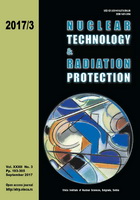
PHYSICOCHEMICAL, MINERALOGICAL AND RADIOLOGICAL PROPERTIES OF RED MUD SAMPLES AS SECONDARY RAW MATERIALS

Vol.
XXXII, No. 3, Pp. 193-305
September 2017
UDC 621.039+614.876:504.06
ISSN 1451-3994
Pages: 261-266
Authors: Snežana S. Nenadović, Gabor Mucsi, Ljiljana M. Kljajević, Miljana M. Mirković, Miloš T. Nenadović, Ferenc Kristaly, and Ivana S. VukanacAbstract
The main goal of the presented research was the preliminary investigation of possibility of red mud – Hungarian dump sites Almasfuzito (sample A) and Ajka (sample B) – application as a pigment or as a raw material for use in the construction materials industry. Also, the aim of this work was the characterization of red mud as industrial waste generated by the Bayer process in the aluminum industry – which may cause environmental problems if appropriate treatment is not carried out. The main mineral phases of both red mud are hematite (Fe2O3), calcite (CaCO3), gibbsite (Al(OH)3) and they consists of particles of median particle size 2.1 µm (sample A) and 2.5 µm (sample B) and have a characteristic red color, which was the reason for its testing for use in the industry of building materials as a pigment for standard concrete mixtures. The radionuclides content in the samples was determined by gamma spectrometry, and the radiological hazards originating from 238U, 232Th, 40K in the samples, were assessed through the radium equivalent activity, and the external radiation hazard index. The absorbed dose rate and the annual effective dose were calculated in accordance with the UNSCEAR 2010 report and the results are presented in this paper.
Key words: gamma-spectrometry, red mud, NORM, mineral composition, physicochemical property
FULL PAPER IN PDF FORMAT (399 KB)